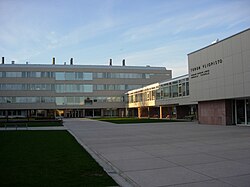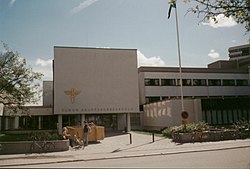University of Turku
Turun yliopisto | |
 | |
Latin: Universitas Aboensis | |
| Motto | Vapaan kansan lahja vapaalle tieteelle (From a free people to free science and learning[1]) |
|---|---|
| Type | Public University |
| Established | 1920 |
| Rector | Kalervo Väänänen |
Administrative staff | 3,412 |
| Students | 19,722[2] |
| Undergraduates | 8,183 |
| Postgraduates | 5,986 |
Doctoral students | 2,011 |
| Location | Turku , Finland |
| Campus | Urban |
| Affiliations | Coimbra Group, UArctic |
| Website | www.utu.fi |
The University of Turku (in Finnish Turun yliopisto, in Swedish Åbo universitet, shortened in UTU), located in Turku in southwestern Finland (EU), is the second largest university in the country as measured by student enrollment, after University of Helsinki. It was established in 1920 and also has faculties at Rauma, Pori and Salo. The university is a member of the Coimbra Group.
Contents
1 History
1.1 The Royal Academy of Turku
1.2 The University of Turku
2 Enrollment
3 Organisation
4 Campus area
5 Research
6 Famous alumni
7 Rectors
8 Chancellors
9 See also
10 References
11 External links
History
The Royal Academy of Turku
The first university to be established in Turku was The Royal Academy of Turku, in 1640, which was transferred to the new Capital, Helsinki, after the Great Fire of Turku in 1827.
Three famous Finns began their studies in Turku in 1822. These were Johan Vilhelm Snellman, Elias Lönnrot, and Johan Ludvig Runeberg who have a statue on University Hill. Another reminder of the Royal Academy is the Old Academy Building near the University's campus.
The University of Turku

The grand opening of the University of Turku in 1922. On the left is Artturi H. Virkkunen, the first rector of the university
The modern University of Turku was founded in 1920. The Finnish intelligentsia wanted a purely Finnish university, the first of its kind in Finland. 22,040 people contributed to the fund-raising campaign. Newly gained independence and the campaign are reflected in the motto of the University about a free people's gift to free science. To honour the memory of these donors, the University has named its specially created liqueur "22 040". Developed by the University's own food chemists, the liqueur does homage to some of the distinctive fruits of the Finnish landscape: the cloudberry, the rowan and the sea buckthorn.
The first premises of the University of Turku were in the centre of the city, by the market square. In the 1950s a new campus was built on Ryssänmäki (Russian Hill[3] – now known as University Hill). In the 1960s the University started to expand rapidly, a process that still continues.
The University was made a public institution in 1974.[4]
Since 1995 the University of Turku has been a member of the Coimbra Group.
In January 2010, the Turku School of Economics merged with the University of Turku, forming a seventh faculty of the university.[4]
Enrollment
The University has approximately 18,000 students, of which 5,000 are postgraduate students having completed their MSc or MA. The largest faculties are the Faculty of Humanities and the Faculty of Mathematics and Natural Sciences.
Organisation

Natural Science Building I (left) and Main Building (right)

ICT Building

Department of History

Turku School of Economics
The university management consists of the Board, The Rector and the vice rectors and the University Collegiate Council.
The Board is the highest decision-making organ of the University and is made up of 10 individuals[5] both from academia, society and studentship. It develops the University's operating processes and approves plans concerning its financing and activities; it decide on the guidelines of granting appropriations; it give its opinion in any matters of significance that concern the University in principle and the Board approves the service regulations and other similar rules.
The Rector directs the activities and processes of the University and solves any issues concerning its general management. The Rector represents the University and uses the University's right to speak in courts of law and in dealings with the authorities. Professor Kalervo Väänänen is currently the elected Rector.[6]
The University Collegiate Council consists of 30 members: ten professors, ten other teaching and research personnel and other staff and ten students.[7]
The university is divided into seven faculties. All departments and some of their research units are listed under the faculty header.
Faculty of Humanities[8]- School of History, Cultural Research and Art Studies
- School of Languages and Translation Studies
Faculty of Science and Engineering[9]- Department of Biochemistry and Food Chemistry
- Department of Biology
- Department of Chemistry
- Department of Geography and Geology
- Department of Future Technologies
- Department of Mathematics and Statistics
- Department of Physics and Astronomy
- Biodiversity Unit of the University of Turku
Faculty of Medicine[10]- Institute of Biomedicine
- Institute of Dentistry
- Turku Biomaterials Centre
- Department of Nursing Science
- Department of Clinical Medicine
- Special Units
- Functional Foods Forum
- The Research Centre for Applied and Preventive Cardiovascular Medicine (CAPC)
- Research Centre for Child Psychiatry
- Turku Brain and Mind Center (TBMC)
- Turku Institute for Child and Youth Research (CYRI)
- Turku PET Centre
- Faculty of Law
Faculty of Social Sciences[11]- Department of Psychology and Speech-Language Pathology
- KiVa antibullying program
- Multiprofessional teaching clinic
- Centre for Learning Research
- Turku Brain and Mind Center
- Department of Philosophy, Contemporary History and Political Science
- Finnish Centre for Democracy Studies
- Centre for Parliamentary Studies
- Public Choice Research Centre
- John Morton Center for North American Studies
- Department of Social Research
- Turku Center for Welfare Research
- Department of Psychology and Speech-Language Pathology
Faculty of Education[12]- Department of Education
- Department of Teacher Education Turku
- Department of Teacher Education Rauma
- Teacher training school in Turku
- Teacher training school in Rauma
- Centre for Research on Lifelong Learning and Education
- Centre for Learning Research
Turku School of Economics
- Department of Management and Entrepreneurship
- Department of Accounting and Finance
- Department of Marketing and International Business
- Department of Economics
- Finland Futures Research Centre
- Centre for Collaborative Research
The university also has number of independent units not affiliated with the faculties:[13]
- Brahea Centre of University of Turku
- Areal Research and Development
- Centre for Maritime Studies
- Centre for Language and Communication Studies
- Finnish Centre for Astronomy with ESO
- Research Unit for the Sociology of Education, RUSE
- Turku Centre for Biotechnology
- Turku Centre for Computing Science, TUCS
- Turku PET Centre
In addition to being a destination for international exchange, the University also has several English-language master's degree programmes and one Finnish-language master's degree programme for international degree students:[14]
- Asian Studies
- Baltic Sea Region Studies
- Bioinformatics
- Biomedical Imaging
- Drug Discovery and Development
- Embedded Computing
- Environmental Sciences
- European Heritage, Digital Media and the Information Society
- Food Development
- Futures Studies
- Global Information Technology Management
- Global Innovation Management
- Information Security and Cryptography
- Institutions and Social Mechanisms
- Learning, Learning Environments and Educational Systems
- Management of Information Technology
- Molecular Biotechnology and Diagnostics
- Molecular Systems Biology
- Physical Sciences, Astronomy Track
- Suomen ja sen sukukielten maisteriohjelma (Finnish and Other Finno-Ugric Languages)
Campus area
The University of Turku shares a campus with Åbo Akademi University and elements of Turku Science Park. The area also encompasses Turku University Hospital (TYKS) and the Student Village. The Administration Building and the surrounding complex was built in the fifties on what became to be known as the University Hill. The campus is constantly expanding. The university has also acquired some former military barracks built in the 19th century. The latest additions include Educarium, which houses the Faculty of Education, Publicum, which houses the Faculty of Social Sciences and the newly completed ICT building which houses the Computer Science Faculties.
Research
University of Turku has been involved in many research projects in the Peruvian Amazon. With the Peruvian Amazon Research Institute (Instituto de Investigaciones de la Amazonía Peruana - IIAP), based in Iquitos, has been studying the Amazon in the BIODAMAZ Project.
Famous alumni
Sauli Niinistö – Current President of Finland
Liisa Hyssälä – Minister of Health and Social Services
Mauno Koivisto – Ninth President of Finland
Paula Lehtomäki – Minister for Foreign Trade and Development
Timo Airaksinen – Professor or Moral Philosophy
Pekka Puska – Physician and Politician
Jarmo Viinanen – Secretary General of the Presidential Office
Heli Laaksonen – Popular poet writing in her native dialect
Kaisa Sofia Matomaki – SASTRA Ramanujan Prize winner 2016
Rectors
|
|
Chancellors
The Chancellor, appointed by the President of Finland upon proposal of the Finnish Government, was to promote science and scholarship, look after the general interests of the University and supervise its activities. The Chancellor confirmed the standing orders and other corresponding general regulations of the University. The most visible task of the Chancellor was the appointment of the Professors and the Docents of the University. Professor Pekka Puska was the last person to hold this position until it was abolished based on the decision of the University Board. The duties were reassigned to the Rector.[15]
|
|
See also
- List of modern universities in Europe (1801–1945)
References
^ Academic Traditions since 1640
^ "Turun yliopiston opiskelijamäärät (In Finnish)". Retrieved 23 May 2018..mw-parser-output cite.citation{font-style:inherit}.mw-parser-output q{quotes:"""""""'""'"}.mw-parser-output code.cs1-code{color:inherit;background:inherit;border:inherit;padding:inherit}.mw-parser-output .cs1-lock-free a{background:url("//upload.wikimedia.org/wikipedia/commons/thumb/6/65/Lock-green.svg/9px-Lock-green.svg.png")no-repeat;background-position:right .1em center}.mw-parser-output .cs1-lock-limited a,.mw-parser-output .cs1-lock-registration a{background:url("//upload.wikimedia.org/wikipedia/commons/thumb/d/d6/Lock-gray-alt-2.svg/9px-Lock-gray-alt-2.svg.png")no-repeat;background-position:right .1em center}.mw-parser-output .cs1-lock-subscription a{background:url("//upload.wikimedia.org/wikipedia/commons/thumb/a/aa/Lock-red-alt-2.svg/9px-Lock-red-alt-2.svg.png")no-repeat;background-position:right .1em center}.mw-parser-output .cs1-subscription,.mw-parser-output .cs1-registration{color:#555}.mw-parser-output .cs1-subscription span,.mw-parser-output .cs1-registration span{border-bottom:1px dotted;cursor:help}.mw-parser-output .cs1-hidden-error{display:none;font-size:100%}.mw-parser-output .cs1-visible-error{font-size:100%}.mw-parser-output .cs1-subscription,.mw-parser-output .cs1-registration,.mw-parser-output .cs1-format{font-size:95%}.mw-parser-output .cs1-kern-left,.mw-parser-output .cs1-kern-wl-left{padding-left:0.2em}.mw-parser-output .cs1-kern-right,.mw-parser-output .cs1-kern-wl-right{padding-right:0.2em}
^ Juslenius, Daniel (1700). Aboa vetus et nova. Suomalaisen Kirjallisuuden Seura. p. 185. ISBN 978-951-746-743-8.
^ ab "The History of the University of Turku". Retrieved 23 May 2018.
^ "University Board". Retrieved 23 May 2018.
^ "Rector". Retrieved 23 May 2018.
^ "University Collegiate Council". Retrieved 23 May 2018.
^ "Faculty of Humanities / Units". Retrieved 23 May 2018.
^ "Faculty of Science and Engineering / Units". Retrieved 23 May 2018.
^ "Faculty of Medicine / Units". Retrieved 23 May 2018.
^ "Faculty of Social Sciences / Units". Retrieved 23 May 2018.
^ "Faculty of Education / Units". Retrieved 23 May 2018.
^ "Independent Units". Retrieved 23 May 2018.
^ "Build your future career with us". Retrieved 31 May 2015.
^ "Chancellors of the University of Turku". Retrieved 23 May 2018.
External links
| Wikimedia Commons has media related to University of Turku. |
- The University of Turku
- Turku Centre for Computer Science (TUCS)
Coordinates: 60°27′15″N 22°17′5″E / 60.45417°N 22.28472°E / 60.45417; 22.28472
